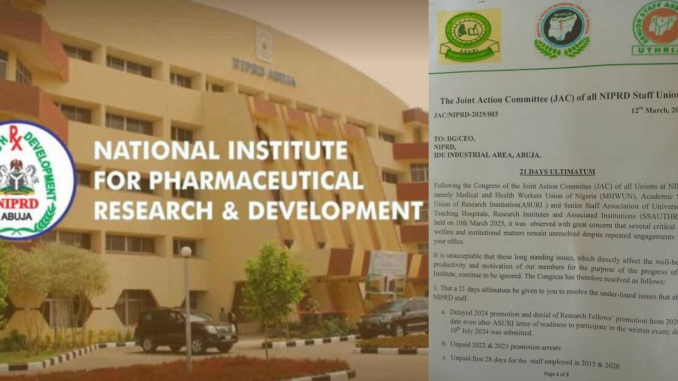
The Joint Action Committee (JAC) of all staff unions at the National Institute for Pharmaceutical Research and Development (NIPRD) has issued a 21-day ultimatum to the institute’s management over what they described as persistent neglect of critical staff welfare and institutional concerns.
The JAC — comprising the Medical and Health Workers Union of Nigeria (MHWUN), Academic Staff Union of Research Institutions (ASURI), and the Senior Staff Association of Universities, Teaching Hospitals, Research Institutes and Associated Institutions (SSAUTHRIAI) —convened a Congress on March 10, 2025, where it reviewed unresolved matters that have continued to hinder the well-being and productivity of staff.
In a joint statement dated March 12, 2025, and signed by Com. Ibrahim G. Ijele (Chairman SSAUTHRIAI and JAC Chairman), Com. Kasim Izebe (Chairman ASURI and JAC Secretary), and Com. Ibiebin A. Ejomafuvwe (Chairman MHWUN and JAC Treasurer), the union leaders expressed dismay over what they described as years of unaddressed grievances.

The statement read, “It is unacceptable that these longstanding issues, which directly affect the well-being, productivity and motivation of our members for the purpose of the progress of the Institute, continue to be ignored.
“The unions are demanding urgent resolution of a list of issues including: Unpaid promotion arrears for 2022 and 2023 and unpaid first 28 days allowance for staff employed in 2015 and 2020.

“Delayed 2024 promotion exercise and denial of promotion to Research Fellows since 2020, lack of staff training and implementation of the 8-year tenure rule without corresponding vacancies.
“Inadequate staff welfare, including lack of staff bus and shortage of personnel, dailure to provide basic office furniture despite recent recruitment and non-payment of repatriation allowances to retirees.
“Poor handling of staff IPPIS matters and refusal to engage unions appropriately and stagnation in the review of NIPRD’s Condition of Service and the enabling Act.
According to the unions, ASURI had even submitted a letter dated July 10, 2024, expressing readiness to participate in the Research Fellows’ promotion examination, but management has yet to act on it.

“This administration continues to implement the 8-year rule for Research Fellows and yet claims there are no vacancies for promotion. It’s a contradiction and a deliberate act to frustrate career progression,” JAC said.
The union leaders warned that if the listed issues are not resolved within 21 days—effective from March 12—they would embark on a seven-day warning strike.
“If management fails to address our demands within the warning strike period, it will escalate to an indefinite strike action until all matters are satisfactorily resolved,” the unions stated.

JAC urged the Director-General and NIPRD management to act swiftly to prevent a full shutdown of the Institute’s activities.
“We remain open to constructive dialogue, but we will not hesitate to take all necessary actions to defend the rights and welfare of our members. Solidarity forever, as we remain partners in progress,” the union added.
Meanwhile, the management of the National Institute for Pharmaceutical Research and Development (NIPRD) has responded to a series of grievances raised by its Joint Action Committee of Unions, appealing to the workers to reconsider their proposed strike action.
In a statement signed by the Acting Director of Human Resource Management, Mrs. Panya G. M., on behalf of the Director-General, the Institute addressed multiple issues raised by the union in a detailed letter dated March 26, 2025.

The union had expressed concerns ranging from delayed promotions, unpaid entitlements, staff welfare, shortage of personnel, and lack of training opportunities, among others.
In its response, management acknowledged the concerns but attributed many of the delays and challenges to bureaucratic and funding constraints, some of which are beyond its immediate control.
On the delayed 2024 promotion and the unresolved promotion of Research Fellows since 2020, the Institute stated that a committee had recommended the use of the Conditions of Service for Research Institutes.
However, the Office of the Head of Civil Service of the Federation (OHCSF) turned down the proposal. The matter, the statement noted, remains under review, affecting both researchers and non-researchers alike.
Regarding the unpaid 2022 and 2023 promotion arrears, management clarified that the Budget Office is responsible for disbursing the funds, and several staff have already received payments as of March 12, 2025.
The issue of unpaid “first 28 days” for staff employed in 2015 and 2020, the Institute said, has also been escalated to the Budget Office of the Federal Ministry of Finance for settlement.
In response to concerns about staff welfare, the statement described the term as “ambiguous” and urged the union to specify particular issues for appropriate redress.
Meanwhile, on the reported shortage of staff, management attributed this to retirements, relocations, and deaths, noting that efforts are underway to obtain waivers for recruitment from the OHCSF.
Management also addressed the lack of office furniture, stating that furniture had been provided to departments based on requests during the 2021 and 2022 recruitment periods.
For repatriation allowances, the Institute confirmed payments to retirees up to 2023, adding that retirees from 2024 onward would be paid as funds become available.
Responding to the issue of the 8-year rule and lack of vacancies for Research Director positions, the statement explained that the rule affected professors equivalent to Directors and that each department is allocated only one vacancy at that level.
Several of the union’s grievances, including those related to staff training, IPPIS matters, and perceived inadequate responses to union communications, were deemed vague or ambiguous.
However, the Institute urged the union to clarify specific concerns to enable management to respond more effectively.
On the status of the NIPRD Act and review of the Institute’s Conditions of Service, management revealed that internal and external stakeholders had worked extensively throughout 2024 to draft the Act, which is now awaiting approval from the Federal Ministry of Health before submission to the National Assembly.
The process, they stressed, is both capital intensive and subject to funding availability.
